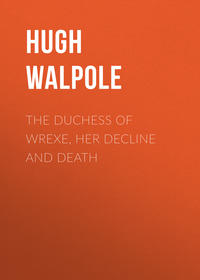Kitap dosya olarak indirilemez ancak uygulamamız üzerinden veya online olarak web sitemizden okunabilir.
Kitabı oku: «The Duchess of Wrexe, Her Decline and Death», sayfa 35
III
When Brim had gone it seemed that he had left that last toast of his in the air behind him.
Christopher was haunted by the thought of the Duchess, he felt her with him in the room; she stirred him to restlessness so that at last, desperately, he took his hat and went out.
His steps took him, round the corner, to Portland Place; here all was very quiet, a few cabs in the middle of the street, a few lights in the windows, the silver field of stars, in the distance the sky golden, fired now and again into life as a rocket rose shielding beneath its glow all that stirring multitude. Sounds rose—a cry, a shout, singing—then died down again.
He was outside No. 104. He thought that he would ring and see whether Mrs. Newton were in; perhaps she had gone to bed, it was after eleven, but, if she were there, he would take one last look at the Portrait before it was packed up and sent down to Beaminster.
Mrs. Newton unbolted the door and smiled when she saw him—"I was just going to bed—There's only myself and Louisa here—and the watchman."
"I won't keep you, Mrs. Newton," he said. "The fancy just took me to look at some of the pictures once more before they're packed up. Lady Seddon told me that a good many of them were to be packed up to-morrow; they won't look quite the same at Beaminster."
"No, that they won't, sir," said Mrs. Newton. "I shall miss the old house. Just to think of the years; and now, all of us scattered!"
She lit a lamp for him and he went up the stone staircase, found the long drawing-room, and there, on the farther wall, the Portrait.
The furniture, shrouded in brown holland, waited like ghostly watchers on every side of him. The huge house, always a place of strange silences and vast disturbances, multiplied now in its long mirrors and its air of cold suspense as though it were waiting for something to happen, showed its recognition of death and death's consequences.
But the Portrait was alive! As he held the lamp up to it the face leapt into agitation, the eyes were bent once again sharply upon him, the mouth curved to speak, the black silk rustled against the chair.
A host of memories crowded the room, he was filled with a regret more poignant than anything that he had felt since her death.
"She was fine! I miss her more than I had any notion that I would! She stirred one up, she made one alive!"
He put the lamp upon the floor and sat down for a minute amongst the shrouded furniture.
His mind passed from Brun's generalizations to the little bundle of people whom he knew—Rachel, Francis, Roddy, Lizzie Rand. To all of them the Tiger's moment had come; and out of it all, out of the stress and suffering and struggle, Rachel's child was to be born—instead of the Duchess the new generation. Instead of this old house, the hooded furniture, the anger at all freedom of thought, the jealousy of all enterprise, the slander and the malice, an age of a universal Brotherhood, of unselfishness, restraint, charity, tolerance …
Perhaps after all, he was an old, sentimental fool. There had always been those at every birth and every death who had had their dreams of new human nature, new worlds, new virtues and moralities....
He looked his last at the Portrait—
"I'm nearly as old as you. I shall go soon. But I miss you … you'd be yourself surprised if you knew how much!"
He took up the lamp and left her.... He said good night to Mrs. Newton and closed the door behind him.
Standing on the steps of the house he looked about him. Portland Place was like a broad river running silently into the dark trees at the end of it. There was a great rest and quiet here.
Southwards the sky flamed, the noise of a great multitude of people came muffled across space with the rhythm in it of a beating song. Rockets slashed the sky, broke into golden stars; the bells from all the churches in the town clashed and, from some great distance, guns solemnly booming rolled through the air.
Christopher, standing there, smiled as he thought of Brun's little picture.
Brun springing up, of course, at the right moment, to point his moral. Brun, who appeared, like some Jack-in-the-box, in city after city, with his conclusion, his prophecy, neat and prepared.
"And we'll have fires out of the Grand Duke's Wood…"
There was the Wood, there the mob, there the Grand Duke, dead and buried—
Christopher shrugged his shoulders; whatever Brun might say human beings were more than summaries, prophecies, conclusions.
As he looked towards the trees and felt a little breeze caress his face with, he could swear, some salt of the sea, he thought of the human beings who were his friends—Rachel, Roddy, Lizzie, Francis.
And then it seemed to him that, out of the trees, down the shining surface of Portland Place, a figure came towards him—the figure of Rachel's child.
